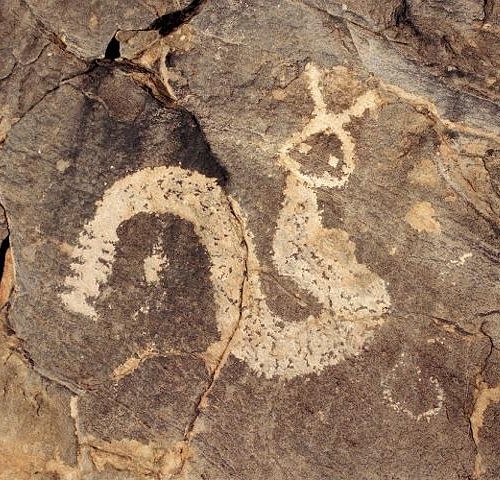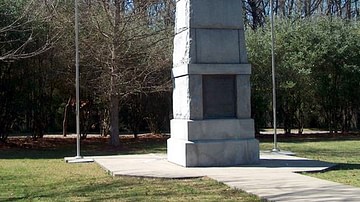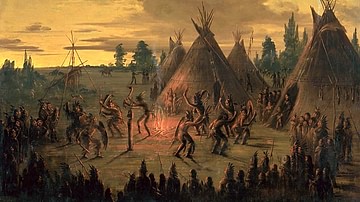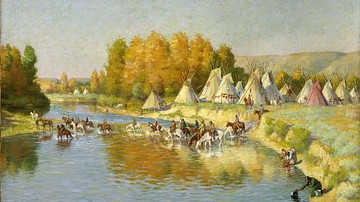The Ulunsuti tales of the Cherokee deal with the mystical jewel, the Ulunsuti ("transparent"), a diamond on the forehead of the great horned serpent Uktena. The Ulunsuti appears in several Cherokee legends, but the story is developed through three tales dealing with its discovery and power, all encouraging belief in and respect for supernatural forces.

Aganunitsi's Search for the Uktena is a hero tale on how the medicine man Aganunitsi brought the great power of the Ulunsuti jewel to the people. The Uktena and the Ulunsuti relates the origin of the great Uktena serpent and the power of the Ulunsuti. The Red Man and the Uktena is another version of the discovery of the Ulunsuti, its power for good, and its danger if one does not treat it with proper respect. Together, these three form the basis of the Ulunsuti legend and are sometimes, though not always, referred to as the Ulunsuti tales.
According to Cherokee belief, the world was made by the Great Creator, Unetlanvhi, with three planes – the higher realm of Galun lati, the earthly realm of mortals, and the lower realm of dark energies. In the middle realm, humans were responsible for maintaining the balance Unetlanvhi had established at the beginning of creation. One maintained this balance through recognition of one's place in the world, honoring the Creator, and living one's life in harmony with one's community and environment.
This balance was always threatened by the dark energies of disease, chaos, and death from the underworld, however, and so it was to one's benefit to have protective powers ("medicine") that could cure the sick, ward off demons and ghosts, predict the future, and help one find food and resources. The most powerful of these objects, according to the old legends, was the Ulunsuti.
The Uktena symbolizes the chaotic forces of the underworld that threaten balance on earth. According to The Uktena and the Ulunsuti, the Uktena was created to assassinate the Sun and, failing in its mission, became so enraged that the people were terrified of it. The creature was too powerful to leave on earth or drop into the underworld, and so it was taken up into Galun lati, where it could be watched over.
Before leaving earth, however, Uktena released others like itself with its power distributed among them in the diamond of the Ulunsuti on their foreheads. In defeating the Uktena, and winning the Ulunsuti, one had not only triumphed over the forces of chaos but could also wield the dark one's energy against future threats and for the benefit of oneself and one's community. This was only possible, however, if one followed the rules closely, mindful of where all power on earth finally comes from.
Text
The following text is taken from Myths of the Cherokee (1900) by James Mooney, pp. 297-301, republished by Dover Publication, 1995.
Aganunitsi's Search for the Uktena
In one of their battles with the Shawano [Shawnee], who are all magicians, the Cherokee captured a great medicine-man whose name was Aganunitsi, "The Ground-hogs' Mother." They had tied him ready for the torture when he begged for his life and engaged, if spared, to find for them the great wonder worker, the Ulunsuti. Now, the Ulunsuti is like a blazing star set in the forehead of the great Uktena serpent, and the medicine-man who could possess it might do marvelous things, but everyone knew this could not be, because it was certain death to meet the Uktena. They warned him of all this, but he only answered that his medicine was strong, and he was not afraid. So, they gave him his life on that condition, and he began the search.
The Uktena used to lie in wait in lonely places to surprise its victims, and especially haunted the dark passes of the Great Smoky mountains. Knowing this, the magician went first to a gap in the range on the far northern border of the Cherokee country. He searched and found there a monster blacksnake, larger than had ever been known before, but it was not what he was looking for, and he laughed at it as something too small for notice. Coming southward to the next gap he found there a great moccasin snake, the largest ever seen, but when the people wondered he said it was nothing. In the next gap he found a green snake and called the people to see "the pretty salikwayi," but when they found an immense green snake coiled up in the path they ran away in fear. Coming on to Utawagunta, the Bald Mountain, he found there a great diyahali (lizard) basking, but, although it was large and terrible to look at, it was not what he wanted, and he paid no attention to it. Going still south to Walasiyi, the Frog place, he found a great frog squatting in the gap, but when the people who came to see it were frightened like the others and ran away from the monster, he mocked at them for being afraid of a frog and went on to the next gap. He went on to Duniskwalgunyi, the Gap of the Forked Antler, and to the enchanted lake of Atagahi, and at each he found monstrous reptiles, but he said they were nothing. He thought the Uktena might be hiding in the deep water at Tlanusiyi, the Leech place, on the Hiwassee, where other strange things had been seen before, and going there he dived far down under the surface. He saw turtles and water snakes, and two immense sun perches rushed at him and retreated again, but that was all. Other places he tried, going always southward, and at last on Gahuti mountain he found the Uktena asleep.
Turning without noise, he ran swiftly down the mountain side as far as he could go with one long breath, nearly to the bottom of the slope. There he stopped and piled up a great circle of pinecones, and inside of it he dug a deep trench. Then he set fire to the cones and came back again up the mountain.
The Uktena was still asleep, and putting an arrow to his bow, Aganunitsi shot and sent the arrow through its heart, which was under the seventh spot from the serpent's head. The great snake raised his head, with the diamond in front flashing fire, and came straight at his enemy, but the magician, turning quickly, ran at full speed down the mountain, cleared the circle of fire and the trench at one bound, and lay down on the ground inside.
The Uktena tried to follow, but the arrow was through his heart, and in another moment, he rolled over in his death struggle, spitting poison over all the mountain side. But the poison drops could not pass the circle of fire, but only hissed and sputtered in the blaze, and the magician on the inside was untouched except by one small drop which struck upon his head as he lay close to the ground; but he did not know it. The blood, too, as poisonous as the froth, poured from the Uktena's wound and down the slope in a dark stream, but it ran into the trench and left him unharmed. The dying monster rolled over and over down the mountain, breaking down large trees in its path until it reached the bottom. Then Aganunitsi called every bird in all the woods to come to the feast, and so many came that when they were done not even the bones were left.
After seven days he went by night to the spot. The body and the bones of the snake were gone, all eaten by the birds, but he saw a bright light shining in the darkness, and going over to it he found, resting on a low-hanging branch, where a raven had dropped it, the diamond from the head of the Uktena. He wrapped it up carefully and took it with him, and from that time he became the greatest medicine-man in the whole tribe.
When Aganunitsi came down again to the settlement the people noticed a small snake hanging from his head where the single drop of poison from the Uktena had struck; but so long as he lived, he himself never knew that it was there.
Where the blood of the Uktena had filled the trench a lake formed afterwards, and the water was black and in this water the women used to dye the cane splits for their baskets.
The Uktena and the Ulunsuti
Long ago - hilahiyu - when the Sun became angry at the people on earth and sent a sickness to destroy them, the Little Men changed a man into a monster snake, which they called Uktena, "The Keen-Eyed," and sent him to kill her. He failed to do the work, and the Rattlesnake had to be sent instead, which made the Uktena so angry that the people were afraid of him and had him taken up to Galunlati [the higher realm], to stay with the other dangerous things. He left others behind him, though, nearly as large and dangerous as himself, and they hide now in deep pools in the river and about lonely passes in the high mountains, the places which the Cherokee call "Where the Uktena stays."
Those who know say that the Uktena is a great snake, as large around as a tree trunk, with horns on his head, and a bright, blazing crest like a diamond upon its forehead, and scales glittering like sparks of fire. It has rings or spots of color along its whole length and cannot be wounded except by shooting in the seventh spot from the head, because under this spot are its heart and its life. The blazing diamond is called Ulunsuti, "Transparent", and he who can win it may become the greatest wonder worker of the tribe, but it is worth a man's life to attempt it, for whoever is seen by the Uktena is so dazed by the bright light that he runs toward the snake instead of trying to escape. Even to see the Uktena asleep is death, not to the hunter himself, but to his family.
Of all the daring warriors who have started out in search of the Ulunsuti only Aganunitsi ever came back successful. The East Cherokee still keep the one which he brought. It is like a large transparent crystal, nearly the shape of a cartridge bullet, with a blood-red streak running through the center from top to bottom. The owner keeps it wrapped in a whole deerskin, inside an earthen jar hidden away in a secret cave in the mountains. Every seven days he feeds it with the blood of small game, rubbing the blood all over the crystal as soon as the animal has been killed. Twice a year it must have the blood of a deer or some other large animal. Should he forget to feed it at the proper time it would come out from its cave at night in a shape of fire and fly through the air to slake its thirst with the lifeblood of the conjurer or some one of his people. He may save himself from this danger by telling it, when he puts it away, that he will not need it again for a long time. It will then go quietly to sleep and feel no hunger until it is again brought out to be consulted. Then it must be fed again with blood before it is used.
No white man must ever see it and no person but the owner will venture near it for fear of sudden death. Even the conjurer who keeps it is afraid of it and changes its hiding place every once in a while so that it cannot learn the way out. When he dies it will be buried with him. Otherwise, it will come out of its cave, like a blazing star, to search for his grave, night after night for seven years, when if still not able to find him, it will go back to sleep forever where he has placed it.
Whoever owns the Ulunsuti is sure of success in hunting, love, rain-making, and every other business, but its great use is in life prophecy. When it is consulted for this purpose, the future is seen mirrored in the clear crystal as a tree is reflected in the quiet stream below, and the conjurer knows whether the sick man will recover, whether the warrior will return from battle, or whether the youth will live to be old.
The Red Man and the Uktena
Two brothers went hunting together, and when they came to a good camping place in the mountains they made a fire, and while one gathered bark to put up a shelter the other started up the creek to look for a deer. Soon he heard a noise on the top of the ridge as if two animals were fighting. He hurried through the bushes to see what it might be, and when he came to the spot he found a great uktena coiled around a man and choking him to death. The man was fighting for his life and called out to the hunter: "Help me, nephew, he is your enemy as well as mine." The hunter took good aim, and, drawing the arrow to the head, sent it through the body of the uktena, so that the blood spouted from the hole. The snake loosed its coils with a snapping noise, and went tumbling down the ridge into the valley, tearing up the earth like a water spout as it rolled.
The stranger stood up, and it was the Asga'ya Gi'gagei, the Red Man of the Lighting. He said to the hunter: "You have helped me and now I will reward you and give you a medicine so that you can always find game." They waited until it was dark, and then went down the ridge to where the dead uktena had rolled, but by this time the birds and insects had eaten the body and only the bones were left.
In one place were flashes of light coming up from the ground, and on digging here, the Red Man found a scale of the uktena. Next, he went over to a tree that had been struck by lightning and, gathering a handful of splinters, he made a fire and burned the uktena scale to a coal. He wrapped this in a piece of deerskin and gave it to the hunter, saying: "As long as you keep this you can always kill game." Then he told the hunter that, when he went back to camp, he must hang up the medicine in a tree outside, because it was very strong and dangerous. He told him also that, when he went into the cabin, he would find his brother lying inside nearly dead on account of the presence of the uktena's scale, but he must take a small piece of cane, which the Red Man gave him, and scrape a little of it into water and give it to his brother to drink and he would be well again.
Then the Red Man was gone, and the hunter could not see where he went. He returned to camp alone, and found his brother very sick, but soon cured him with the medicine from the cane, and that day and the next, and every day after, he found game whenever he went for it.





